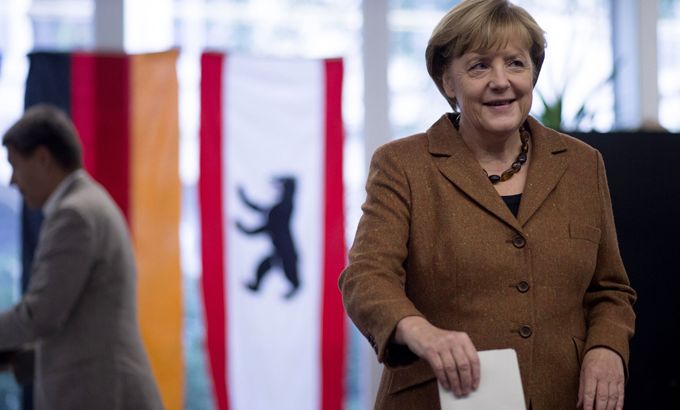German vote leaves Merkel looking for allies
Conservatives enjoy best results since 1990 but concessions to centre-left rivals could be cost of coalition deal.

German Chancellor Angela Merkel faces the daunting prospect of persuading her rivals to help form a new government after her conservatives notched up their best election result in more than two decades, but failed to win an absolute majority.
Merkel’s Union bloc achieved its best result since 1990 on Sunday to put her on course for a third term, winning 41.5 percent of the vote and finishing just five seats short of gaining overall control of the Bundestag.
The 59-year-old seemed to acknowledge the difficulty of the challenge ahead.
“We are open for discussions,” she said, after accepting a standing ovation from cheering supporters waving German flags at CDU party headquarters in Berlin. “I had a first contact with the SPD [Social Democrats] chairman who understandably asked that the SPD first hold its party meeting on Friday,” she told reporters.
‘Comfortable in opposition’
Merkel led a mostly successful “grand coalition” in her first term from 2005 to 2009, but this time around, the SPD, who scored less than 26 percent in the elections, will be loath to support her unless she pays a high price in terms of cabinet posts and policies.
During the campaign, the centre-left party argued for a minimum wage and higher taxes on the wealthy, both opposed by Merkel.
“The SPD would perhaps be more comfortable in opposition and is therefore negotiating from a position of relative strength,” the European Council on Foreign Relations think-tank said in a statement. “Merkel needs SPD support more than the SPD needs her.”
Based on past experience, coalition negotiations have taken on average nearly a month, and observers suggest it will likely be weeks before a deal is reached.
“It will need a bit of time,” Merkel said.
But polls show that the consensus-driven German public would welcome a right-left partnership, as would Berlin’s European partners, who hope the SPD might soften Merkel’s austerity-focused approach to struggling eurozone members.
Should the SPD refuse to enter talks, Merkel could turn to the environmentalist Greens, though such a partnership might prove even more fraught.